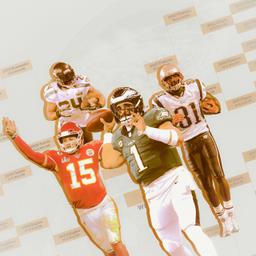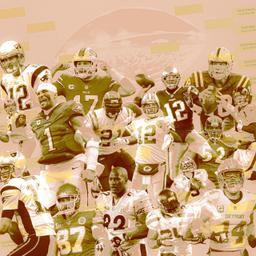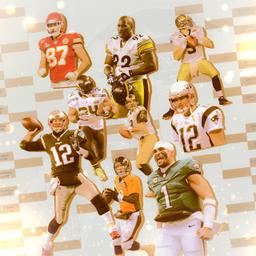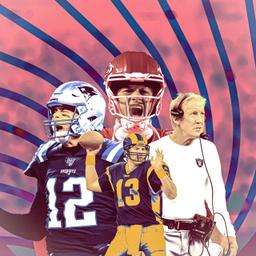Editor’s note: The Elite Eight polls have closed. Vote in the championship here! You can also check out every team we considered for the bracket and how the NFL has evolved over the past 25 years.
And we’re down to eight.
Yesterday featured some excruciatingly close matchups. Chances are, if you booted up the voting between the 2002 Bucs and 2016 Pats at any point on Tuesday, you saw a perfect 50-50 split:
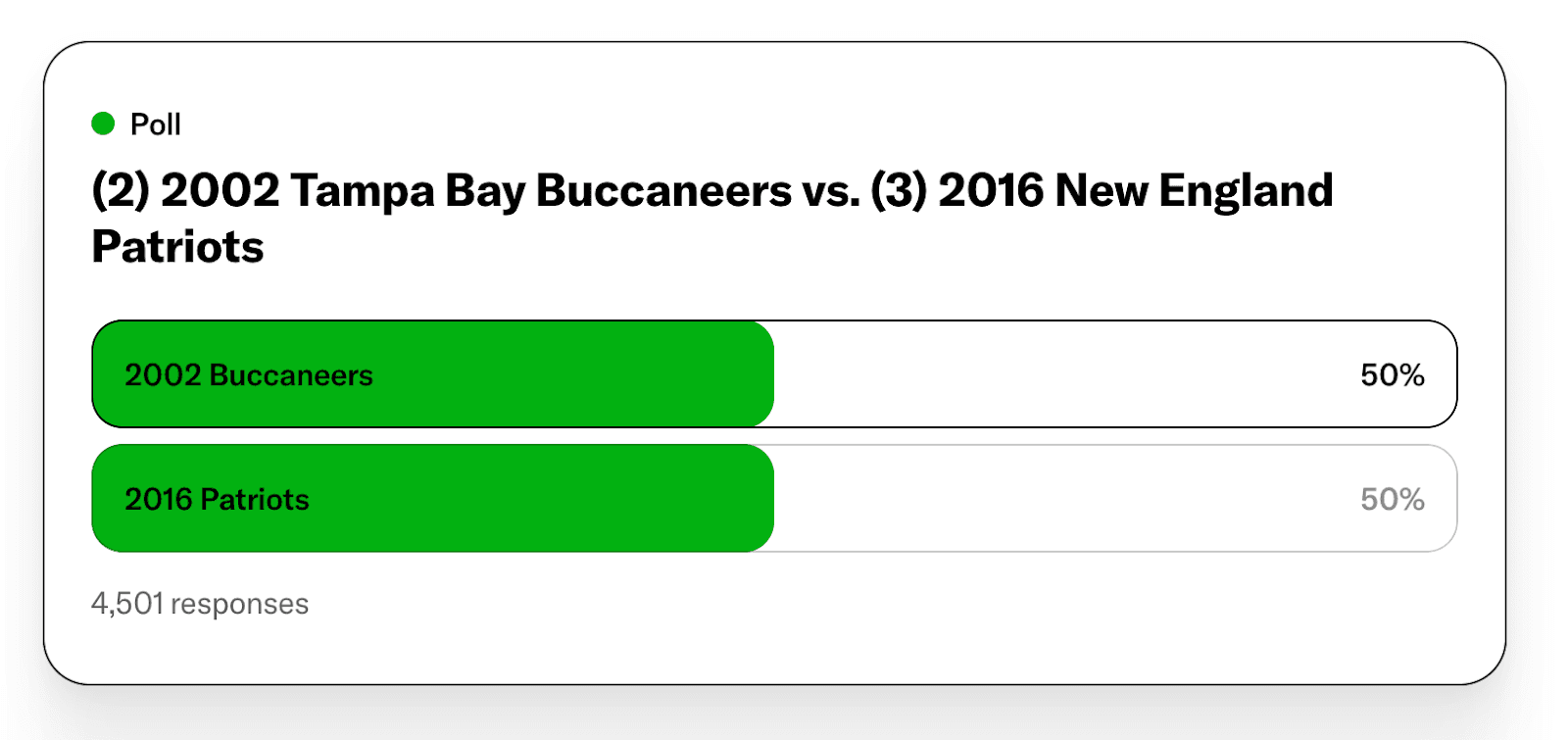
But the Patriots had a slight edge on our Instagram page:
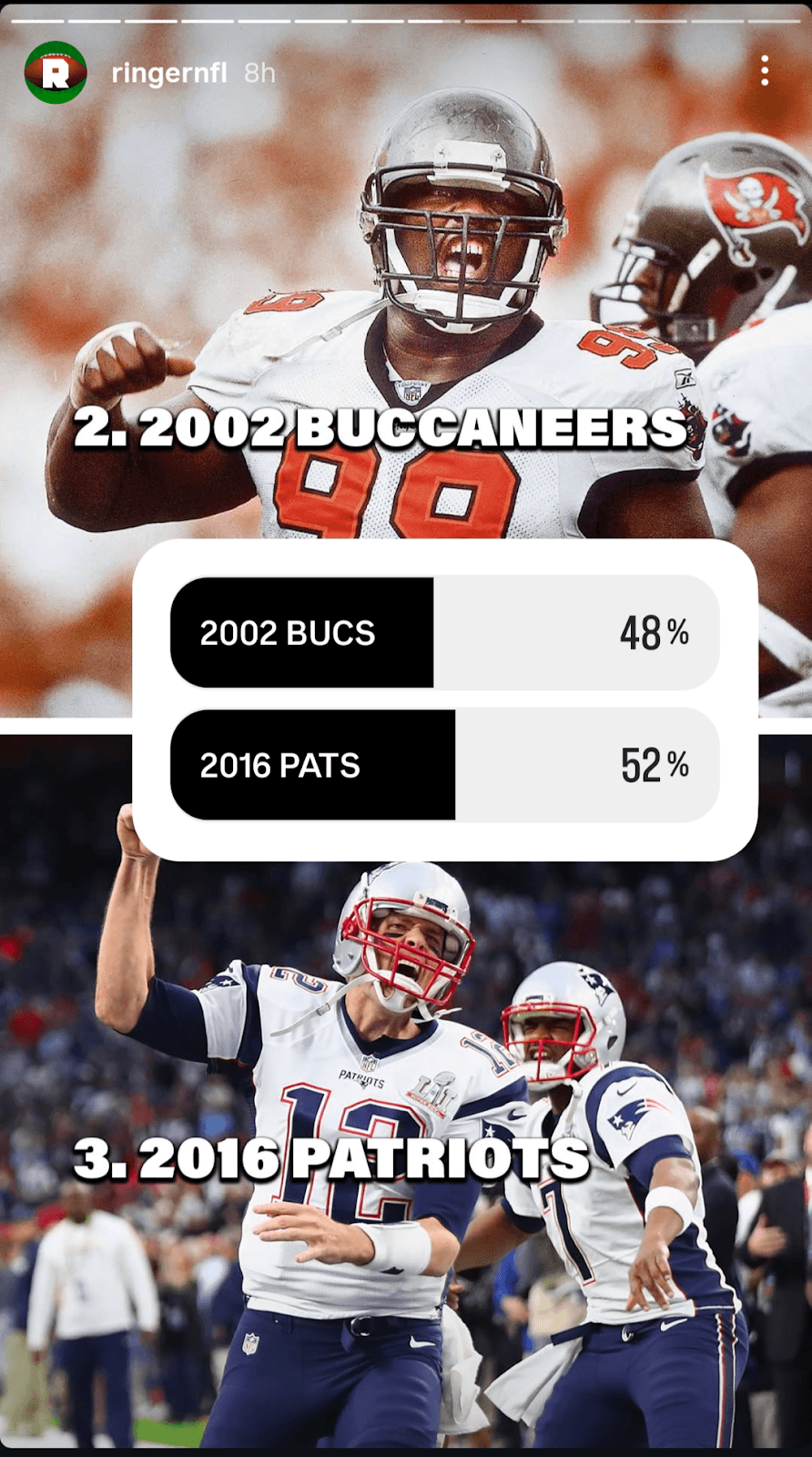
And in the end, that was enough. In total, the Buccaneers got 3,435 votes, and the Patriots got 3,462. By just 27 votes, New England moves on to the Elite Eight.
The website-vs.-social split was even more dramatic in the matchup between the 2009 Saints and 2014 Patriots. The Saints had a 63-37 edge on the website, while the Patriots led 60-40 on Instagram. Ultimately, the website gets more votes than the Instagram reel, and so New Orleans pulled away in this one, saving us from half of the Elite Eight being composed of New England squads.
The other contests weren’t as tight. All of the no. 1 seeds prevailed handily, while the 3-seed 2000 Ravens toppled the 2-seed 2001 Rams.
That sets up some juicy matchups for today. First, the 2013 Seahawks face the 2009 Saints. That Seattle squad is rightfully remembered for its dominance (probably because they were so loud about it), but that New Orleans team was a buzz saw, starting 13-0 and, for a second consecutive season, ranking first in offensive points and yards. I mean, perhaps the Saints should lose some legacy points for the whole Bountygate thing, but on the field this was undoubtedly the peak for the Drew Brees era of Saints football. But then, they never had to deal with the Legion of Boom.
Next, the 2024 Eagles host the 2016 Patriots. Following their Week 5 bye, the Eagles famously won every game save for a 36-33 loss to the Commanders in a contest Jalen Hurts missed most of due to injury. But the 2016 Pats have a similar story, with one of their two losses coming in a game that third-stringer Jacoby Brissett started as Tom Brady served his Deflategate suspension. When fully staffed, both these teams were nearly unstoppable. How would they fare against each other?
We also have the 2007 Patriots facing the 2000 Ravens. The best offense of this century versus the best defense of this century. The stuff dreams are made of.
Finally, the 2019 Chiefs take on the 2004 Patriots in a clash of dynasties. Though the 2019 team gave Kansas City its first Super Bowl win of the Patrick Mahomes era, that squad is also the peak form for this current run of the Chiefs. The offense hadn’t fallen off yet, as it has in recent seasons, and the defense had become one of the better units in the league under Steve Spagnuolo. Those units ranked fifth and seventh in points, respectively, and the Chiefs won every playoff game by two or more scores (even if it did take a 21-point fourth quarter to topple the 49ers in the Super Bowl). Meanwhile the ’04 Pats represent the peak form for the first Patriots dynasty. That team ranked fourth in points scored and second best in points allowed, and they too mostly cruised through the postseason (a late touchdown by the Eagles made that Super Bowl box score look a little closer than the game was in reality). Which squad was best, though? You get to decide.
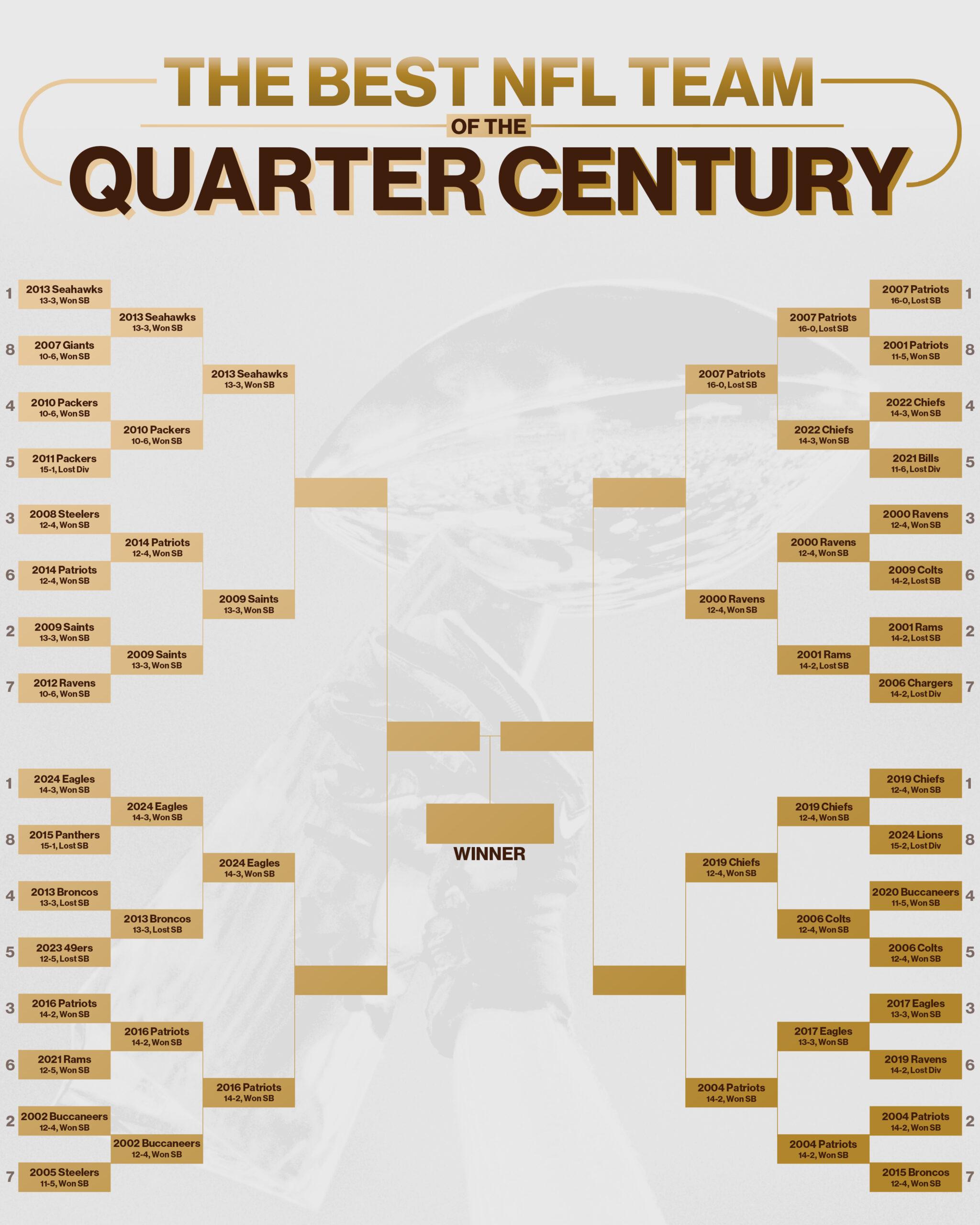
Once again, we’ll close voting at 6 p.m. ET. Come back Thursday for the Final Four. —Riley McAtee
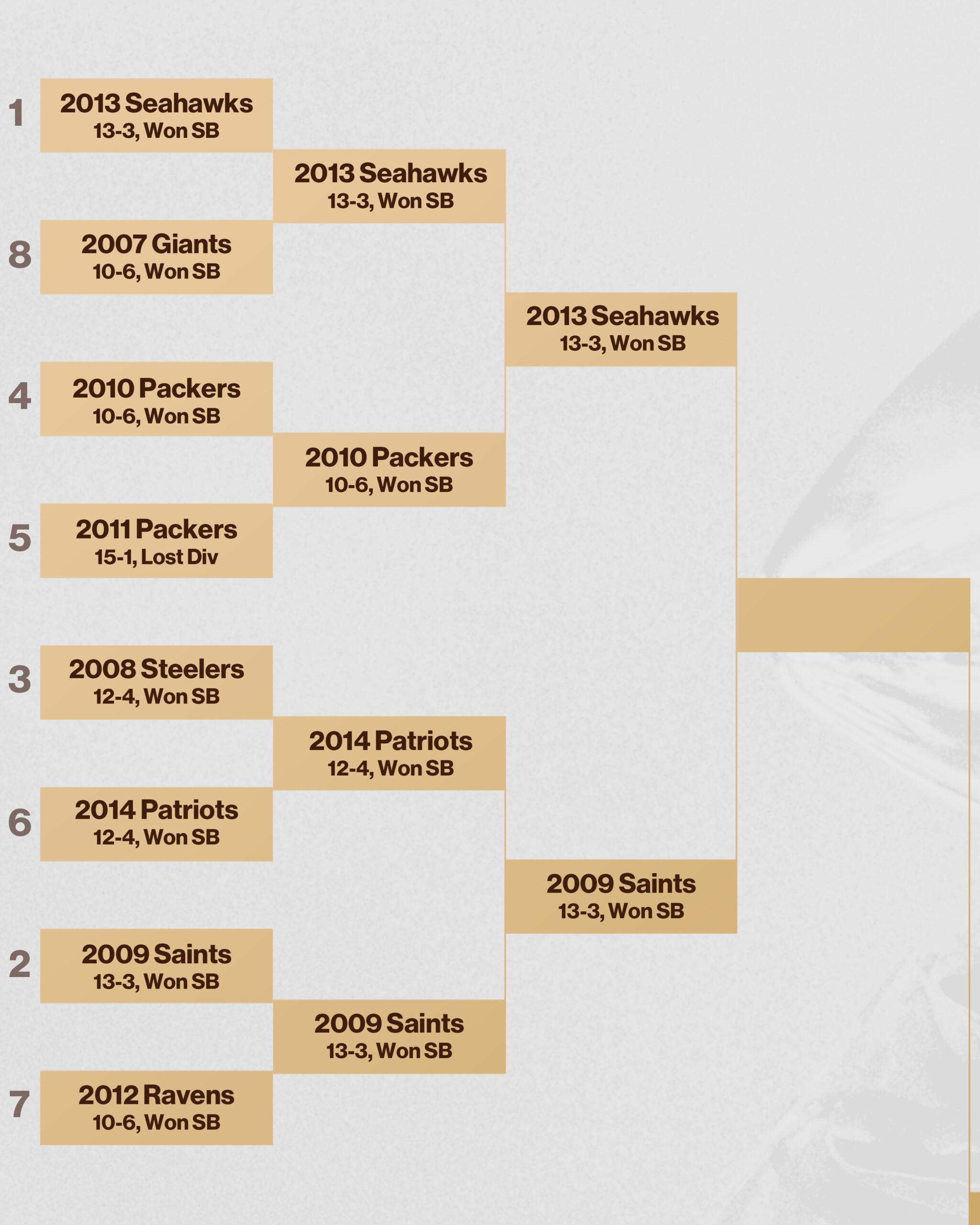
(1) 2013 Seattle Seahawks vs. (2) 2009 New Orleans Saints
2013 Seahawks
Record: 13-3
Result: Won Super Bowl XLVIII (43-8 vs. Broncos)
There are a million things I could write about the peak era of the Seahawks Legion of Boom defense, but perhaps the easiest explanation for just how ludicrously good that unit really was is this: On the biggest stage, in Seattle’s 43-8 blowout victory over the Broncos in Super Bowl XLVIII, the Seahawks made league-MVP Peyton Manning and the NFL’s all-time highest-scoring offense look like a bumbling JV squad.
The much-anticipated heavyweight bout quickly turned into a lopsided rout. The Broncos, who had racked up an NFL-record 606 points (37.9 points per game) on the back of Manning’s league-record 55 touchdown throws, were left completely disoriented by the LOB's extraordinarily disciplined, hard-hitting style. The Seahawks forced a failed-snap safety on the Broncos’ first play from scrimmage before picking Manning off on his team’s first and third possessions following the safety—the second, a 69-yard pick-six, made it 22-0 and more or less put the game away before the first half even ended. The trio of Richard Sherman, Earl Thomas, and Kam Chancellor held things down in the back end, bolstered up front by the likes of Bobby Wagner, K.J. Wright, Michael Bennett, Cliff Avril, and a host of others.
That outcome came as no surprise to the uniquely brash, trash-talking Seahawks defense, which had allowed the fewest points (14.4 per game) and fewest yards (273.6 per game) of any team in the NFL that season while generating a league-best 39 takeaways. That unit ranked first in defensive DVOA that year, obviously, and ranks sixth best on the all-time DVOA list. The team’s offense, led by plucky then-second-year quarterback Russell Wilson, carried its own weight, of course, finishing the year tied for eighth in points per game and seventh in DVOA. Wilson paired up with Marshawn Lynch to help reanimate the read option in pro football, and Lynch gave the offense an identity of toughness that rivaled that of their defensive counterparts. Add in the team’s highly efficient special teams group (which ranked fifth in DVOA that year), and it’s clear that the team general manager John Schneider and head coach Pete Carroll built that year will go down as one of the most complete, most fun, and most dominant we’ll ever see. —Danny Kelly
2009 Saints
Record: 13-3
Result: Won Super Bowl XLIV (31-17 vs. Colts)
If you weren’t rooting for the Saints to win the Super Bowl in 2009, you were a Colts fan, a Vikings fan, or morally bankrupt. Four years after Hurricane Katrina had led residents to seek refuge in the Superdome, and three years after Steve Gleason’s blocked punt in the Superdome on Monday Night Football, the New Orleans Saints were the most incredible story in sports.
The Saints were the first NFC team to start 12-0 or better since the ’85 Bears. They clinched the no. 1 seed in the conference for the first time in team history. Drew Brees completed 70.6 percent of his passes (which is now quaint but at the time had never been done before). The Saints bested Brett Favre in the NFC championship and then faced what was, to that point, potentially the best Peyton Manning Colts team we’d ever seen in the Super Bowl. Sean Payton made perhaps the ballsiest decision in football history, trying a surprise onside kick out of halftime—and it worked. Tracy Porter pick-sixed Manning—possibly because Indy’s Reggie Wayne slowed down on a route that he didn’t think he was getting the ball on—and the play led to so much traffic on Twitter that the site crashed (which is now a pretty routine occurrence).
Brees, a guy who'd left the Chargers with a crooked elbow and then failed his physical in Miami, was captured in an iconic pose holding the Lombardi Trophy with his son in hand and confetti raining down. He was an underdog story for an underdog city. It’s still the only pro sports championship New Orleans has ever won. Frankly, the 2009 Saints probably meant more to their city than any other team on this list. —Danny Heifetz
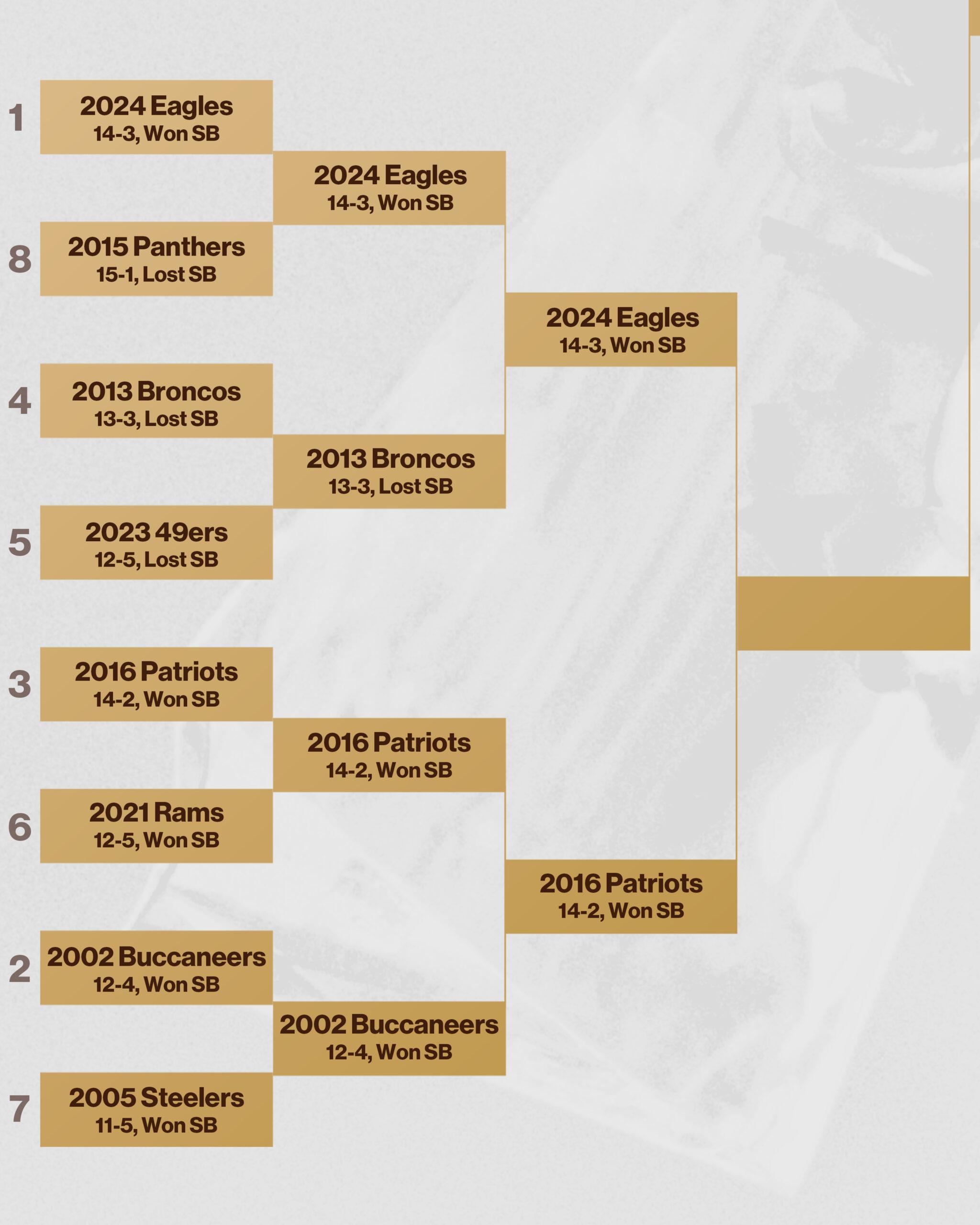
(1) 2024 Philadelphia Eagles vs. (3) 2016 New England Patriots
2024 Eagles
Record: 14-3
Result: Won Super Bowl LIX (40-22 vs. Chiefs)
It took a little while, but by the time the 2024 Eagles got to New Orleans to take on the Chiefs in the Super Bowl, it was clear that they were one of the best teams of this century. The Eagles had gotten off to a 2-2 start but then won 16 of their next 17 games, en route to a convincing championship. Vic Fangio’s defense was built from back to front, with suffocating coverage that allowed the pass rush time to get home. And the Eagles held up against top-tier quarterbacks like Patrick Mahomes, Lamar Jackson, Joe Burrow, Matthew Stafford, and Jayden Daniels. This defense was tested often, and it came out on top over and over and over again.
Offensively, the goal was to be a pick-your-poison unit. Pound the ball with Saquon Barkley and a dominant offensive line until defenses prove that they can stop you. If that happened, Philly could lean on Jalen Hurts, A.J. Brown, DeVonta Smith, and the passing game. In the Super Bowl, Chiefs defensive coordinator Steve Spagnuolo effectively loaded the box to limit Barkley’s production. But it didn’t matter because Hurts lit Kansas City up through the air as the Eagles rolled to a dominant 40-22 victory. (Reminder: It was 40-6 before two Chiefs garbage-time touchdowns.)
Overall, the Eagles outscored their opponents by 68 points in the playoffs—the third-best differential of any Super Bowl team this century. From a roster talent standpoint, there aren’t too many teams on this list that stack up to the 2024 Eagles. Howie Roseman built a juggernaut, and when things clicked, it seemed like this team was unbeatable. —Sheil Kapadia
2016 Patriots
Record: 14-2
Result: Won Super Bowl LI (34-28 OT vs. Falcons)
A season that ended with Tom Brady’s crowning achievement began with one of his lowest moments: serving a four-game suspension for his role in the Deflategate scandal. But his absence almost didn’t matter to this team. The Pats went 3-1 to start the season, losing only the Week 4 matchup because third-string rookie Jacoby Brissett was forced to play with a torn thumb ligament. Such is the case when you have a stacked roster and a coaching staff operating at the peak of its powers.
The Patriots would lose just one more game that season, with Brady posting an absurd 28-2 touchdown-to-interception ratio (still the best ever) following his return. This team had seven All-Pros—just two shy of the 2007 Pats’ tally—and boasted so much talent that it was able to survive a season-ending injury to Rob Gronkowski (a luxury of having Martellus Bennett as your no. 2 tight end) and the continued employment of Matt Patricia. (We joke, but his unit did take “bend don’t break” to its extreme that year—the Pats defense finished 16th in DVOA but first in points allowed.)
The regular season was just prologue to a masterpiece, however: the 28-3 Super Bowl comeback versus the Falcons. It was Brady’s fifth Super Bowl and his finest moment—the one that put to rest any other GOAT arguments. And it was made all the sweeter by him standing on the podium, celebrating another Lombardi Trophy within earshot of the man who had suspended him just months earlier. Football immortality and the ultimate vindication. —Justin Sayles
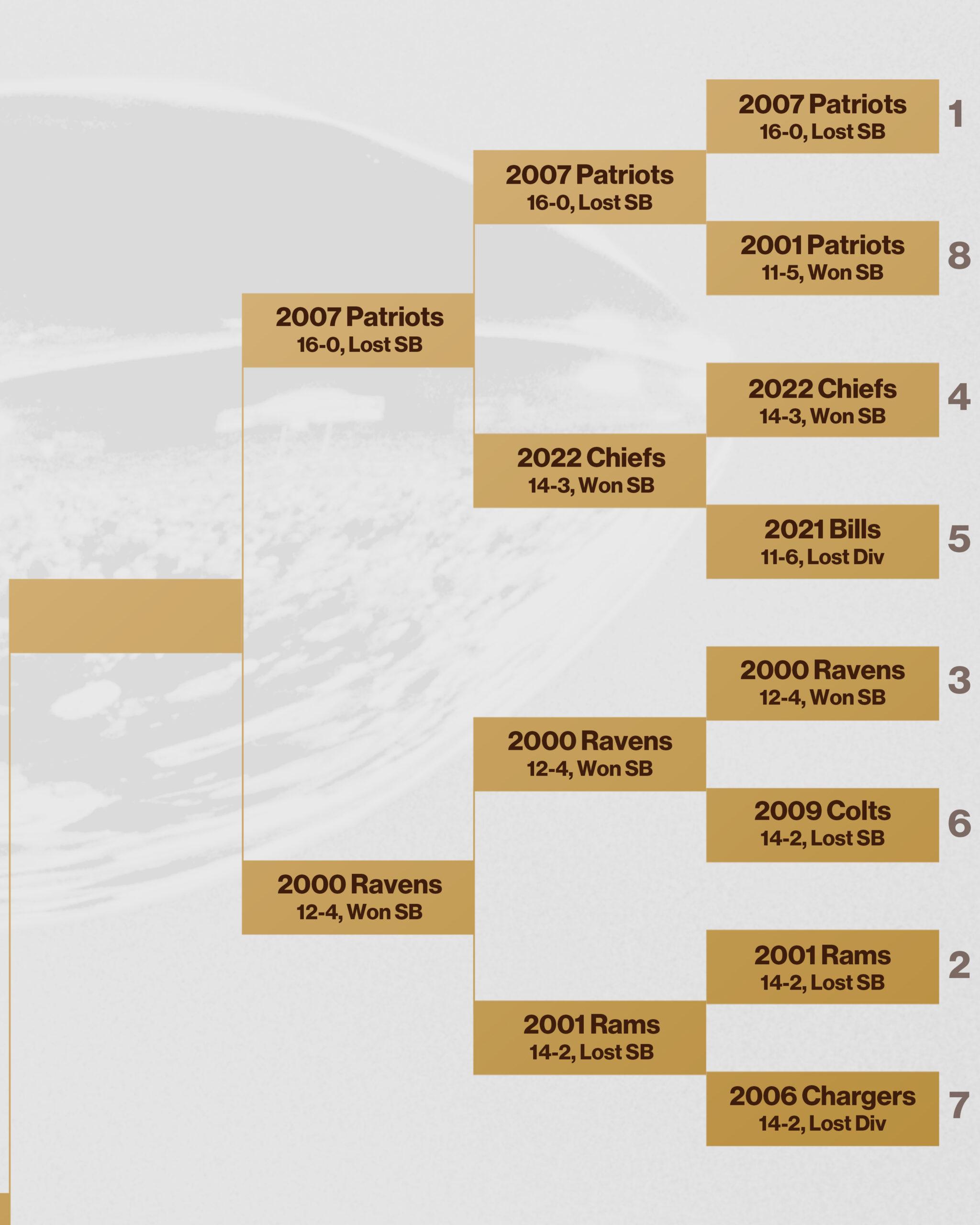
(1) 2007 New England Patriots vs. (3) 2000 Baltimore Ravens
2007 Patriots
Record: 16-0
Result: Lost Super Bowl XLII (17-14 vs. Giants)
The New York Giants beating the undefeated 2007 Patriots was perhaps the single greatest moment of my life. So as a Giants fan, I feel uniquely qualified to say that the 2007 New England Patriots are unequivocally the best football team of the 21st century, even though they did not win the Super Bowl.
You know the accolades: Tom Brady became the first player to throw 50 touchdown passes in a season. Randy Moss broke the single-season receiving touchdown record. The Patriots offense as a whole scored more points than any other team in league history. And they were the first team to go undefeated in the regular season since the 1972 Dolphins, and the first (and to date, only) team to go 16-0.
The ’07 Patriots also changed the game. They made three-receiver sets the default. They moved offenses from under center to shotgun. Football before and after this team looked different, both on the field and in the record books. Brady may be the best player in the history of football, and 2007 was inarguably the best season of his career. Despite that Super Bowl loss, there is zero doubt in my mind that if you put every team in the 21st century on the same field, the ’07 Patriots walk away champions. —Heifetz
2000 Ravens
Record: 12-4
Result: Won Super Bowl XXXV (34-7 vs. Giants)
High on the list of “Things That We’ll Never See Again” is watching a defense allow just one touchdown on a run to a championship. Statistically, the 2000 Ravens defense is arguably the best ever, squeezing the air out of almost every offense it matched up against. The Ravens started the season with a shutout of rival Pittsburgh, went 12-4 in spite of five consecutive weeks without an offensive touchdown, and stomped all over Denver and Oakland in the AFC playoffs—two of the top three scoring offenses that year. Baltimore’s résumé compares favorably with that of any other team in this bracket.
Baltimore allowed just 10.3 points per game that year, with 14 of its 19 total games allowing no more than one touchdown, and I’m sure almost every offensive player in the NFL would flinch if Hall of Fame linebacker Ray Lewis even looked in their direction. By the time we got to the Super Bowl, it was clear that no one on the New York Giants was interested in meeting him between the tackles, either. It felt like the Giants spent the entire first quarter inside of their own 20-yard line, toggling between running into a brick wall and having quarterback Kerry Collins shoved into one every time he dropped back. While Lewis shared the stage with fellow Hall of Famer Rod Woodson, linebacker Peter Boulware, and Pro Bowler Sam Adams, it was clear that Lewis was the best player in the league, the centerpiece of his defense and the heartbeat of the organization, and bringing Baltimore the first championship in franchise history will always be the crowning achievement in his long career.
Because the 2000 Ravens were objectively bad on offense, led by unheralded head coach Brian Billick (who left the league after he was fired in 2007), and feel like a relic of football’s past due to the advent of the modern passing game, properly appreciating a team like this will be tough. But if you remember what a phenomenon the 2000 Ravens defense was, you’ll have trouble picking a team you’d rather advance than this one. —Diante Lee
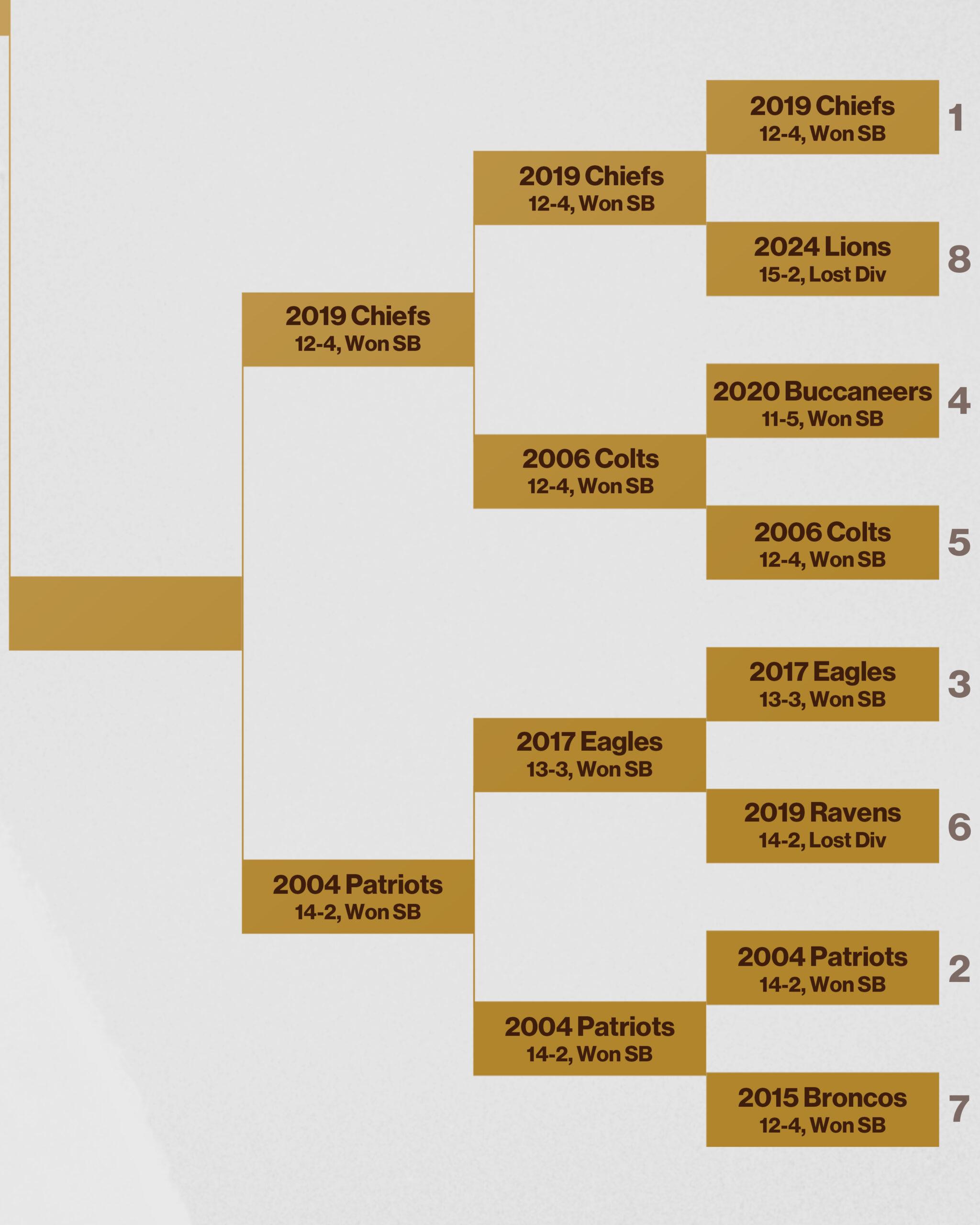
(1) 2019 Kansas City Chiefs vs. (2) 2004 New England Patriots
2019 Chiefs
Record: 12-4
Result: Won Super Bowl LIV (31-20 vs. 49ers)
It was tough to pick the best Chiefs team of the Patrick Mahomes era, so in many ways this 2019 team will account for the incredible three-year run that kicked off his career as a starting quarterback. The 2018 squad was a revelation and finished the regular season ranked first in points (565, the third most of the century), touchdowns, total yards, and yards per play. They were explosive and efficient, and by total offensive EPA, they were the seventh-best offense of the century so far. But they came up short in the playoffs, losing at home to the Patriots in the conference championship and robbing us of a Super Bowl matchup against Sean McVay’s Los Angeles Rams. I may never forgive Dee Ford (or the officiating crew that flagged him for offsides).
The 2019 Chiefs didn’t quite hit the same offensive highs, but this was the year they broke through in the postseason and Mahomes built his legacy as one of the greatest gamers. He led Kansas City back from double-digit deficits in each of their three playoff wins, including the Super Bowl victory over the 49ers. And that 2019 team had defensive closers—Tyrann Mathieu was a huge addition to the secondary, and Chris Jones was an absolute monster in the biggest moments.
The 2020 Chiefs made it back to the Super Bowl, but the offense was a shell of itself by February because of injuries on the offensive line. Ultimately, the 2018 Chiefs might have been more fun, but the 2019 Chiefs were better when it counted, and that’s worth plenty when determining not just the best Chiefs team of the Mahomes era but the best teams of this quarter century. —Lindsay Jones
2004 Patriots
Record: 14-2
Result: Won Super Bowl XXXIX (24-21 vs. Eagles)
This team gets the nerd bump. They had the highest DVOA of any of the six Patriots championship teams. Despite a challenging schedule, they went 14-2 in the regular season. In the AFC playoffs, the Patriots faced two legit Super Bowl contenders in the Colts and the Steelers. Indianapolis had averaged a league-best 30.4 points per game in the regular season, but the Patriots shut them down in a 20-3 victory in the divisional round. The Steelers were one of two teams that beat the Patriots in the regular season, but New England got its revenge in the AFC championship, leaving Pittsburgh with a 41-27 victory. They then got past Andy Reid, Donovan McNabb, and the Eagles in the Super Bowl.
This was a classic “do your job and don’t beat ourselves” Bill Belichick team. During their playoff run, the Patriots committed just one turnover and forced 11. That plus-10 turnover margin in the playoffs is tied for second best this century. They might have lacked the star power of future Patriots teams, but this was a balanced group—they finished the regular season in the top five in both offensive and defensive points per game—that could win in different ways. —Kapadia
